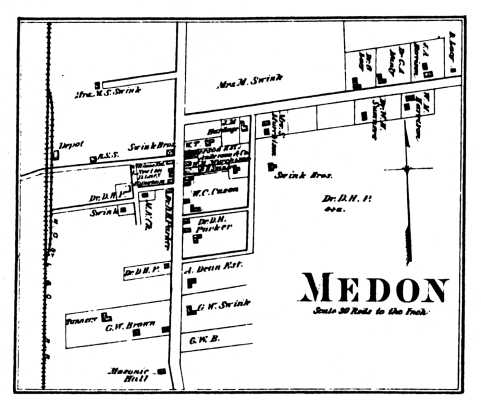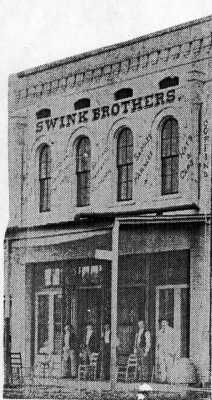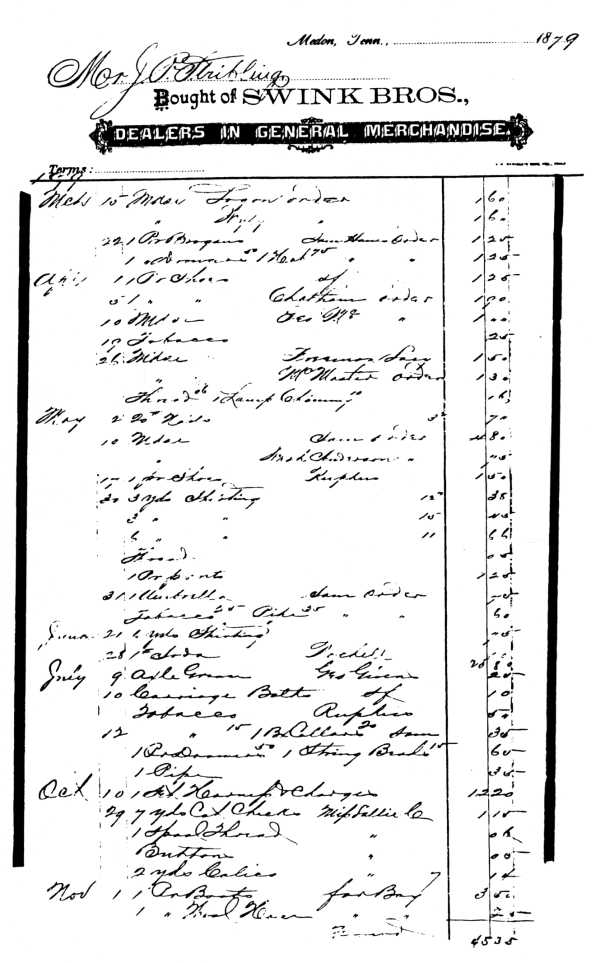A GENEALOGICAL MISCELLANY III,
MADISON COUNTY, TENNESSEE
By Jonathan K. T. Smith
Copyright, Jonathan K. T. Smith, 1996
(Page 42)
WAS CAPTAIN PETER J. SWINK GORED BY A COW?
- Revision -
Captain Peter J. Swink, remembered as having been an acquisitive and strong-willed Madison Countian, was born in Salisbury, Rowan County, North Carolina, May 11, 1796. Research done by Mrs. A. L. Tapp and summarized into a typescript, "Michael Swink Lineage," by Janice Threadgill Watlington, 1988, reveals convincingly that Peter Swink was one of the several children of Leonard and Mary (Smith) Swink of Rowan County; that his paternal grand-father had been a German immigrant (Page 5).
Peter J. Swink was married to Polly Pinkston in Rowan County, November 11, 1818 (bond) and they had several children: Jesse Wilborn Swink; Mariah Catherine Swink; David Marion Swink; William Pinkston Swink; James Alexander Swink; Turner Lamar Swink; Burwell Robert Swink, the first of whose given names was often spelled as it was pronounced, even thus so, Burrell, in his father's will. It is likely that Polly Swink died in childbirth or from complications of same resulting from the birth of this last child as the RALEIGH REGISTER, North Carolina, announced her death in its July 17, 1837 issue as having died July 3, the wife of Captain Peter J. Swink of Rowan County.
It is almost certainly a fact that Peter Swink was a captain in the Rowan County militia, either during or after the War of 1812 as he was addressed in Tennessee as well as North Carolina as Captain Swink. He was remarried, likely early in 1838, to Malinda (Milla) Booe (February 18, 1818- April 13, 1890). He had decided on moving from Rowan County to Madison County in western Tennessee and bought several town lots in Medon, September 20, 1837 while still a resident of Rowan County (according to the deed); land bought from William B. Boyd of Madison County and one of the town's earliest developers and William S. Wisdom of McNairy County. (Madison County Deed Book 6, page 447) On March 19, 1839 he acquired several other tracts of land in his new home territory, including four acres on the southwest corner of Medon. (IBID., page 444)
Captain Swink built a substantial house in Medon, back from the stage road (Main Street in Medon) and reliable tradition indicates that he used a portion of it as a tavern or ordinary, a place where travelers could take meals and sleep overnight. (Lena Lacy Murdock drew on this tradition and reported it in an article dealing with the history of Medon in THE JACKSON SUN, June 26, 1945, "The stage tavern was run by Peter J. Swink and his wife, Malinda in the present home site occupied by G. W., Alvin, Harrison and his wife, Linnie Swink Harrison.") Captain Swink also operated a mercantile business and served as postmaster for Medon, October 1840-July 1845 (U.S. POSTMASTER APPOINTMENTS, West Tennessee, 1789-1971, by L. Malone McDaniel, 1992, page Ma-2), keeping and distributing mail from his store. However it was as a farmer that the captain prospered. In the Slave Schedule, 1850 (August 29) Census, Madison County, Civil District 2, he was listed with 13 slaves, most of whom were young. His real estate valuation was listed as $10,000 that year. (IBID., regular census entry, page 234) His vocation was given as a "merchant" in this census.
Captain Swink and his second wife had several children: Sarah Elizabeth Swink; Henry Harrison (Tip) Swink (who served as a 3 Lt., Company C, 14th Tennessee Cavalry, CSA, from July 1863 until paroled in May 1865); George Washington Swink (who served in Company C, 6th Tenn. Inf. Reg., CSA from May 15, 1861 until discharged June 14, 1861); Peter (Toby) Swink; Darius Newbern Swink; Peter Lavinia Swink, who later switched her name to Lavinia Peter Swink.
(Page 43)
Little Peter Swink, whom his parents called Toby, was but three years old when by a tragic twist of fate he was gored by a cow and died as a result. This event was announced in the WEST TENNESSEE WHIG, Jackson, August 31, 1849:
|
Fatal Occurrence. - A small son of Mr. Swink, at Medon, in this county, was gored by a cow a few days since and died in a short time. |
A sentimental poem was written in memory of Toby by Dr. David J. Newbern, a neighbor and fellow citizen of Medon, published in the same newspaper, September 7, 1849:
|
The following verses on the death of Capt. P. J. & Mrs. Milla Swink's little son, Toby, who died on the 23rd inst., of a wound inflicted by the horn of a cow, were written for the mother of the deceased, by Dr. David J. Newbern. My cherub child lies still in death. His mangled body is still with us, 'Tis hard indeed to give him up. But go DEAR BABE, thy guardian friend Farewell DEAR DABE, farewell awhile, Medon, Tenn., Auguat 24th, 1849. |
This child's death was listed in the Mortality Schedule, 1850 U.S. Census, Madison County, page 50: Peter Swink, age 3, born in Tennessee, died August 1849 from "violence."
Somehow a story was "floated" in later times that it was Captain Swink who was fatally wounded when he was gored by a cow. There is nothing known from reliable sources or records to indicate such a death for the captain. Perhaps over the years, as generations died and memories faded, it was forgotten that little Toby had been killed by a cow and it was assumed that it was his father who was so killed.
When Captain Swink executed his last will, dated September 15, 1851, two years after his little son's demise, he began it with, "I P. J. Swink being in a low state of health but of sound mind, knowing the uncertainty of all human things, do hereby publish and declare this to be my last will and testament. . . ." (Madison County Will Book 5, pages 104) There is nothing suggestive in the preamble of this will that indicates a violent death for Captain Swink, but rather that he was the victim of a prolonged illness. It strains the credulous somewhat to entertain the idea that he was gored by a cow while trying to aid his son or while beating the culprit cow for its deadly deed.
In his will, Captain Swink provided that his debts be paid forthwith.
(Page 44)
To his son, William P. Swink, he left $25. To his son, David Marion Swink, he left $200; to his son, James Alexander Swink, he left $175; to his son, Turner L. Swink, he left $175. "The money to be paid to the above named children out of the first moneys that may come into the hands of my executor." Further, "For the love and affection I have for my wife Melinda I loan to her during her natural life or widowhood all my property of every description to be /for/ her use and control for the purpose of raising and educating the children, and after her marriage or death all the property to be sold and equally divided amongst my children as follows, viz. Jesse Wilborn Swink, Maria Catherine's children one share, Burrell Robert, Mary Susan, Sarah Elizabeth, Henry Harrison, George Washington, Darius Newbern and if my wife should have a child within nine months from the date of my death that child is to share equally with the above named children - but provided my wife should die before my youngest child or children are educated there shall be a reasonable allowance made by three disinterested men for the purpose of raising and educating such children before any division of property shall be made, never the less the moneys allowed to William P. Swink, D. M. Swink, J. A. Swink and Turner J. Swink shall be paid to them as above specified."
After the children named above as his heirs had each received a share amounting to $1200 (these being his younger children), any remaining estate was to be divided among all his children, including the sons whom he had bequeathed cash. He provided, under the laws of the time that Melinda's legacy from her father's estate, at her mother's demise, should be used for the "use and benefit" of her and her children. He appointed David D. Newbern as executor of his will. (IBID., pages 104-107)
Captain Swink's tombstones gives his death date as October 7, 1851 being 55 years, 7 months and 26 days old:
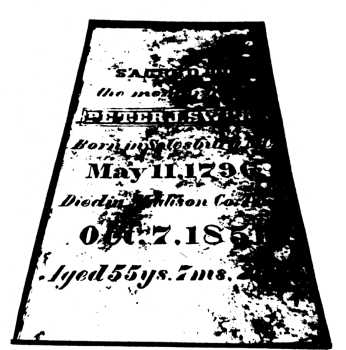
On November 3, 1851 Captain Swink's last will was probated in court after it was testified-to by G. W. McGuire and E. S. Leggett, witnesses to this document, that this was the will they had witnessed and executed by Peter J. Swink. (Madison County Court Minute Book 6, page 386) By January 6, 1852 several of the captain's heirs contested the will, stating that it was not valid and as such the county court heard the case: Jesse W. Swink, John Evans, M. C. Swink, Daniel M. Swink, William P. Swink, James A. Swink, Turner L. Swink, Burwell R. Swink and Mary Susan Swink vs David D. Newbern, executor of Peter J. Swink's will. (IBID., pages 422, 439) The case was referred to
(Page 45)
the Madison County Circuit Court for adjudication but the circuit court minutes for that period are missing, but from subsequent events it is known that the court rendered the will valid. Milla Swink continued to live at her homeplace in Medon, purchasing some land on her own over the years. Her son, George W. Swink and his family made their home with her and it was during this long period of time, for a certainty, that improvements were made in the architectural construction of the family residence, those evident in its fine restoration in recent years by its present owners, Robert A. and Leola (Upton) Cummings.
Milla Swink died April 13, 1890 and her body was buried in the Hollywood Cemetery in Jackson. Her husband's body had been buried on the homeplace, near the joining of the Cummings and Dorothy Melton yards and close to where Riverside Drive joins Highway 18. A substantial box vault was erected over his grave beside a small tombstone that surely marked the grave of little Toby. The latter tombstone long ago disappeared and Captain Swink's tombstone was moved to Hollywood Cemetery about 1980 in a move designed for its permanent preservation but about a dozen years later several descendants had it - the top slab, the vault sides having been discarded - moved back near its original location where it is now, well-anchored, about seventy feet northwest of the Melton residence. The captain's remains were not "disturbed" as some persons have thought, but the Reverend Elton Watlington and wife, Janice Threadgill Watlington, of Memphis, instrumental in the effort to better preserve the captain's tombstone by having it moved to Hollywood, have made clear that her ancestor's bodily remains were not moved, either to Hollywood or to the present location of the tombstone.
After Milla Swink's death, her son, George W. Swink, was appointed the administrator for her estate, January 13, 1891. (Madison County Court Minute Book 18, page 429) It was recorded in this action that she had died April 13, 1890, leaving a personal estate worth about $500. On March 2, 1891 the court considered the proper manner to distribute her estate, having been the widow of Peter J. Swink who on September 15, 1851 executed his last will, providing her with a life estate in all his property which at her death or remarriage was to have been divided among certain ones of his children as stipulated in his will. Again, her death date was given as April 13, 1890 and the court ordered the county court clerk to investigate the circumstances of the Swink estate and to report the results to the court. (IBID., pages 446-447) On March 11, 1891 the clerk's report was presented to the court, providing the details given in ibid., pages 448-452, which copied pages are reproduced on page [46] of this publication.
George W. Swink and Henry H. Swink, partners in a successful mercantile business (Swink Brothers Company) in Medon since 1876 bid $3000 for the 9 acre homeplace and the 709 acre farm which was confirmed to them, April 8, 1891 (IBID., pages 476, 484) and they bid for the 200 acre tract also, offering $250 for it but W. P. Harris had made an initial bid of $20 and the court decided that this tract should go to Harris but for his improved bid of $105. (IBID., pages 476, 486) Robert W. Haynes and S. D. Hays, lawyers involved in settling the estate, were allowed $150 in fees. (IBID., page 487) Mrs. P. A. Westbrook was appointed guardian of Jenny H., Ada and Ida Evans, beneficiaries, by the Johnson Co., Texas court where they lived, Feb. 8, 1892 which provision was recorded in Madison County, May 5, 1892. (IBID., Book 19, page 58)
George W. Swink made a final report to the county court, as his mother's estate administrator, in January 1894, showing that $545.49 had been collected and the amount owed was worked out to be the same, thereby closing the estate settlement. (Madison County Settlement, Administrators Book 8, pages 166-167)
(Page 46)
MADISON COUNTY COURT MINUTE BOOK 18
page 448
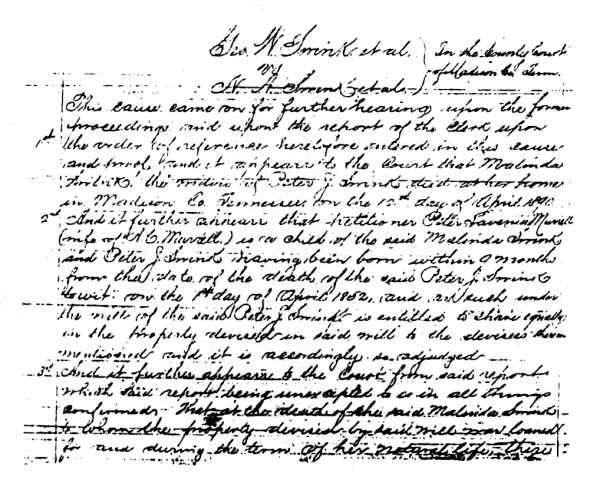
page 449
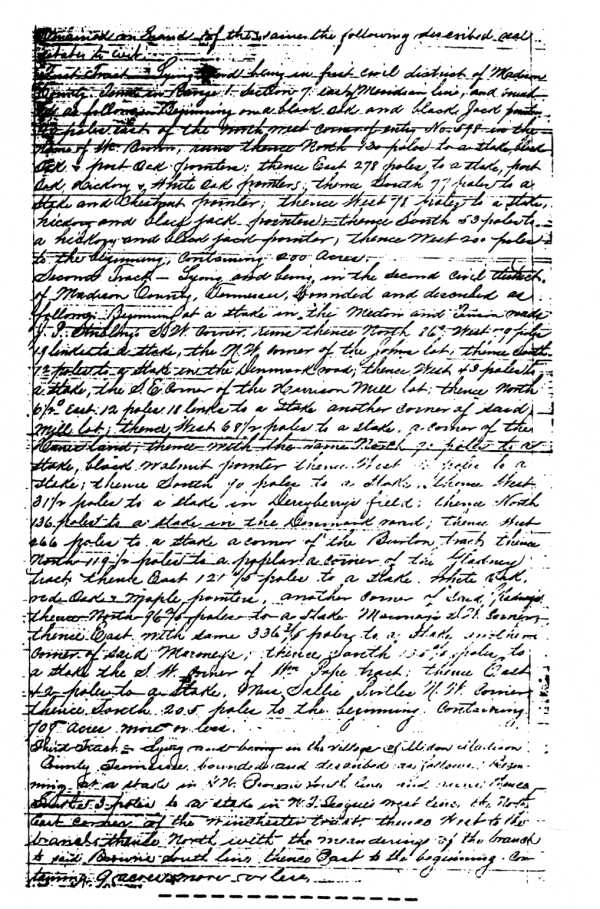
page 450
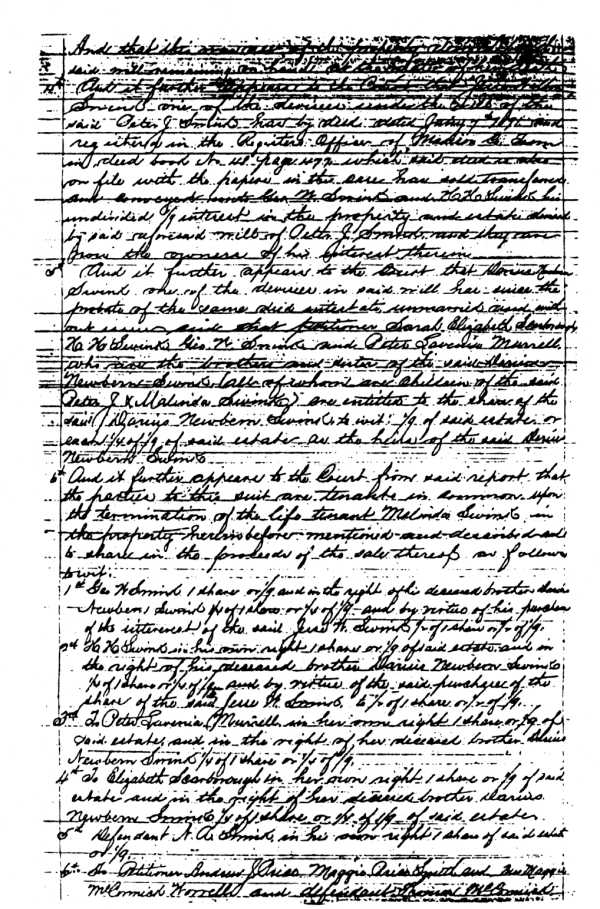
page 451
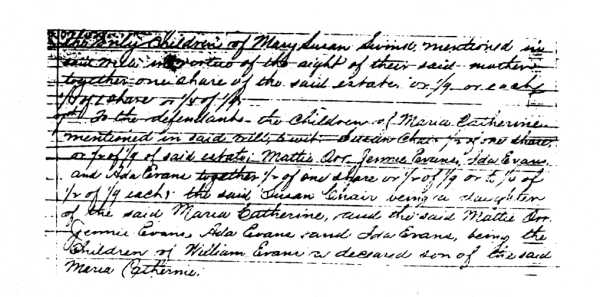
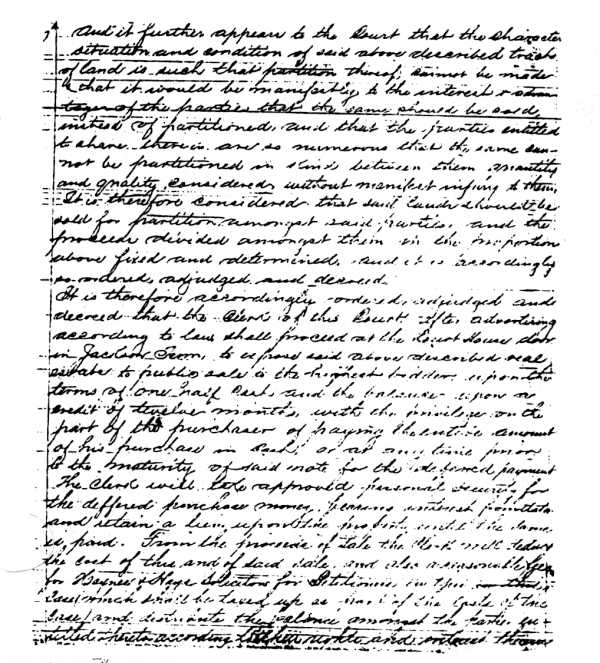
page 452
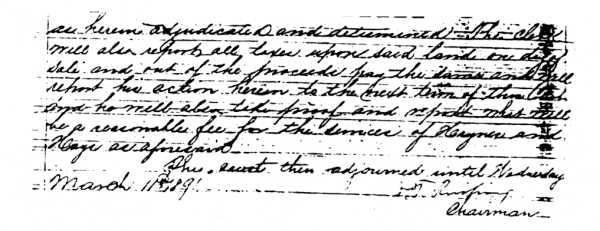
(Page 47)
|
|
|
Map of Medon, Tennessee from the Map of Madison County and Jackson, Tennessee, by D. G. Beers, Philadelphia, Pennsylvania, 1877. At the upper left-hand corner is noted the homeplace of Mrs. M. S. Swink, now the residence of Robert and Leola Cummings. Various Swink properties are noted on this map, including house sites of G. W. Swink (before he made his home with his mother), H. H. Swink and the long shaded rectangle on the east side of Main Street that indicates the site of the large, brick Swink storehouse. |
George W. Swink moved into his parents' old residence, making a home there with his mother and his surviving children. He had married, secondly, Miss Olivia Polk Taylor (July 17, 1850-May 1, 1881), a daughter of Abner Taylor of Madison County, December 23, 1880 (Madison County Marriage Book G, page 272). She lived only a few months and after her death, George Swink was appointed administrator of her estate valued at $6000. (IBID. County Court Minute Book 15, page 547) She was buried in the Taylor Cemetery on the Jackson-Denmark Road (now on the Billy Hopper farm), with a fine tombstone marking her grave, inscribed, "How many hopes lie buried here."
George W. Swink's daughter, Lennie, second wife of George W. A. Harrison, lived in the old Swink residence; her step-daughter, who was also her second cousin, Lavenia Harrison, was raised in this dwelling. This lady later married Earl R. Tant. On January 12, 1912 George W. Swink, as surviving member of Swink Bros. Co., sold to his son-in-law, Harrison, the 21 acre homeplace, reserving 1/8 of an acre in it for the Swink graveyard and 233 acres on the Medon-Denmark Road for $10,352. (Madison County Deed Book 80, page 1) In her last will executed September 23, 1847 and probated February 11, 1948, Lennie S. Harrison left her property to her step-daughter, whom she called simply her daughter in her will, and in the event she died before her step-mother, then the step-grandson, William Earl Tant, was to be her sole legatee. (IBID., Will Book F, page 127)
On April 1, 1949 Lavenia Harrison Tant and her husband sold 20.8 acres in Medon, including the old Swink homeplace and graveyard, to Thomas Griffin (Griff) McDaniel (IBID., Deed Book 154, page 636), who along with his wife, Mary Sue, sold this 20.8 acres to Frank Upton for $6500, May 19, 1949 (the
(Page 48)
land having been surveyed April 18, 1949), which included 1/8 of an acre 48, constituting the Swink graveyard. (IBID., Deed Book 157, page 268) Among the other real estate devised by Frank Upton to his kinsman, C. L. Upton, April 10, 1991, was this old homeplace (IBID., Will Book CC, page 176; probated May 28, 1991), which became the latter man's property after Frank Upton's demise. On December 29, 1993 C. L. Upton deeded a 1/2 interest in 131/2 acres in Civil District 10 (old C.D. 2) which included the tract on which the Swink place was located, to his daughter and son-in-law, Leola (Upton) Cummings and Robert A. Cummings. (IBID., Deed Book 536, page 142) Then, May 14, 1994, C. L. Upton made a deed for the entire 131/2 acres to the Cummings. (IBID., Deed Book 543, page 345)
The Cummings have restored the old Swink residence, a frontal view of which is here reproduced, courtesy of Leola Cummings.
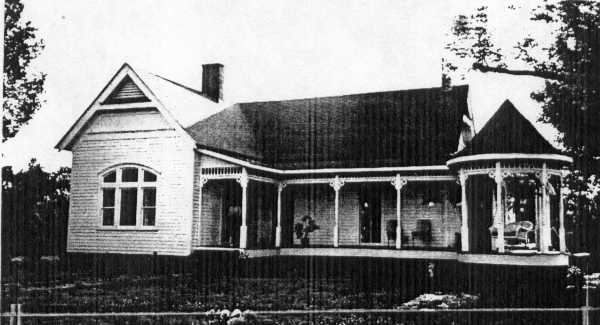
Genealogical Data
The children of Captain Peter J. Swink and his first wife, Mary (Polly) Pinkston (with most of the data generously shared with the writer by Carolyn Latham Monroe, Jackson, Tennessee and William Earl Tant, Northridge, California):
- JESSE WILBORN SWINK (February 2, 1820-October 25, 1904), who was twice married: to Mary Elizabeth Robinson (April 4, 1826-January 31, 1887), February 14, 1843 and Martha Cobb (March 2, 1858-March 30, 1938), also on February 14 in the year 1888. Children: Katie Swink (1844-1903), wife of Thomas J. Butler; Sophia Elizabeth Swink (1846-1929), wife of Thomas Nesbitt; David Randall Swink (1848-1926); Susan B. Swink (1850-1927), wife of H. D. Harris; Sallie Swink (1852-1929), wife of James Mays; Gertrude Thomas Swink (1854-1939), wife of James T. Stone; John Malcolm Swink; Ella Britton Swink (1860-l926), wife of James William Pacaud; Florence Swink (Jan. 10, 1863- Aug . 10, 1904)
1900 U.S. Census, June 13, Civil District 6, Chester Co., Tenn. (Enurnerator's District 15, sheet 5): Jesse W. Swink, born Feb. 1820, N. C.; Nartha A. Swink, wife, born March 1859; married 11 years, 3 children; Charlie C. Cobb, born Dec. 1887; Uther Swink, daughter, born Nov. 1888 (This was Uthie who later married Bill Vestal.); Jessie A. Swink, born Sept. 1892; Florence Swink,
(Page 49)
born January 1864. Buried in Pisgah Cemetery in Chester Co. are J. W. Swink (1820-1904), M. E. Swink (1826-1887), M. A. Swink (1858-1938), Florence Swink (1863-1904), Jessie Swink (Sept. 3, 1892-Jan. 20, 1912). - MARIAH CATHERINE SWINK, who married John Evans, July 16, 1839.
- DAVID MARION SWINK, about whom nothing else is presently known.
- WILLIAM PINKSTON SWINK (1826-l874), who married Cassenia Lousinda Gray and moved to Navarro County, Texas.
- JAMES ALEXANDER SWINK (1826-1901), who first married Sarah Ann Mays, Dec. 2, 1852 and moved to Rusk Co., Texas; eleven children. He married, secondly, to Sally Raney; two children.
- TURNER LAMAR SWINK (1832-1877), who married Melissa Helen Gray, Nov. 1855.
- MARY SUSAN SWINK, who married Elijah Price, April 17, 1852.
- BURWELL ROBERT SWINK, born in 1837.
Children of Captain Peter J. Swink and Malinda Booe (with most of the data generously shared with the writer by Carolyn Latham Monroe, Jackson, Tennessee and William Earl Tant, Northridge, California):
- SARAH ELIZABETH SWINK, born January 27, 1839; married John Bell Scarborough, July 30, 1856. Children: william Scarborough; John Scarborough; Sally Scarborough; Thomas Scarborough; Mamya Scarborough; Mary Scarborough; Lennie Scarborough.
- HENRY HARRISON (Tip) SWINK, March 18, 1841-April 6, 1909; married Sallie Marshal Williams (Dec. 6, 1849-March 6, 1909), May 23, 1871. Children: (Dr.) Henry Jackson Swink (Mar. 24, 1872-Mar. 14, 1915); Robert Burle Swink (Dec.6, 1874-Jan. 12, 1933); Nona Swink (July 6, 1876-July 23, 1911); Mary Luvenia Swink (Feb. 4, 1880-Nov. 4, 1903); Lyde Williams Swink (Mar. 8, 1882-Jan. 1, 1967); George Wilbur Swink (Jan. 26, 1884-April 17, 1974); Sarah Myrtle Swink (July3, 1888-November 20, 1966). Henry H. Swink, his wife and several members of his family are buried in Hollywood Cemetery, Jackson.
- GEORGE WASHINGTON SWINK, September 1, 1843-December 2, 1917, married (1) Anna Eliza Buchanan (Jan. 9, 1849-Dec. 15, 1876), May 18, 1869, a daughter of Colonel T. N. Buchanan; (2) Olivia Polk Taylor (1850-1881), December 23, 1880 (no children). Children of the first marriage: Walter Thomas Swink, born August 20, 1870; George Buchanan Swink (Feb. 11, 1872-July 19, 1877); Lennie Anna Swink (Aug. 14, 1873-Feb. 5, 1948), married, as his second wife, George William Alvin Harrison (Sept. 12, 1870-April 8, 1949), March 23, 1902 (no children). Norma Swink (March 11, 1875-April 4, 1876). Ann Eliza Swink, born December 3, 1876, who married Frank Howard. George W. Swink and his first wife are buried with their two infant children in the Mt. Tabor Cemetery near Medon.
- PETER (TOBY) SWINK, born 1846; died August 23, 1849.
- DARIUS NEWBERN SWINK, born 1849; died 1890; unmarried.
- LAVENIA PETER SWINK, April 1, 1852-May 14, 1893, married Alexander Campbell Murrelle (Sept. 15, 1851-April 1, 1901), Sept. 13, 1871 and had children: Hattie Lavenia Murrelle (Aug. 15, 1872-Sept. 19, 1899), who married, as his first wife, George William Alvin Harrison, April 29, 1892 (and they had two children to survive infancy, one, Nannie Lavenia Harrison, 1897-1967, was married to Earl Raymond Tant and had a child, William Earl Tant, who married and had several children; Pearl Alethia Murrelle (Sept. 19, 1875-Nov. 16, 1921), wife of Fred Rutherford; Henry Alexander Murrelle (born 1880), who later lived in Texas.
Lena Lacy Murdock wrote (THE JACKSON SUN, June 26, 1945), "The Swink Brothers were in business in Medon longer than any other firm. Mr. Henry Harrison Swink (called Tip) carried on the mercantile department and the store supplied many farmers and sharecroppers. Mr. Tip Swink was captain in the Confederate Army and was severely wounded, so that he limped slightly throughout his life. He was one of the directors at the organization of the Second National Bank, Jackson and served for a number of years /on its official board/. He married Sallie Williams and they reared a large family - the only one of whom, I think, now living in Madison County is Mrs. Robert Pritchett. Mr. George Swink was the director of the farm end of the firm - they owning much land. He too was a high-toned Christian gentleman of courtly manners and his home was rarely without guests - and the Methodist ministers were sure of a welcome there. His children, Dr. Walter Swink of Memphis, Mrs. Lyde (Frank)Howard (deceased) and Mrs. Linnie (Alvin) Harrison, occupying the old home in Medon."
From TENNESSEE, THE VOLUNTEER STATE, by John T. Moore and Austin P. Foster, published in Chicago, 1923, volume 2, pages 544-545:
|
ROBERT BURLE SWINK. A list of the leading citizens of Tennessee contains the name of Robert Dune Swink of Medon, one of the representative and honored members of the community in which he resides. He is a member of the state senate and is prominent in business circles. His record both as an official and as a business man has been so honorable that he has gained the confidence and goodwill of all with whom he has been brought into contact. Mr. Swink was born in Medon on the 6th of December, 1873, a son of Henry Harrison and Sallie Elizabeth (Williams) Swink, also natives of this state. The father was one of the substantial citizens of the community in which he made his home and during the Civil war served as a member of Forrest's cavalry. |
(Page 50)
|
In the acquirement of his education Robert Burl. Swink attended the public sehools of Medon and later enrolled in the Union University at Jackson, Tennessee. Subsequently he entered the University of the South at Sewanee and upon the completion of his course there engaged in the mercantile business in Medon. He bee Since continued in that line of business under the name of Swink Brothers and he has proven to be a business man of excellent ability as an organizer, forming his plans readily and being determined in their execution. Those factors enable him to conquer obstacles which deter many a man and they have been salient features in his success. He is also interested in the drug business, being part owner in two large concerns under the firm name of Swink & Company. For five years, from 1905 to 1310, Mr. Swink was chief inspector for the New York Central Railroad, covering eleven southern states. He was also tie contractor for several years, discontinuing that line of business in 1917. He has now retired from active business life and devotes the greater part of his time and attention to looking after his plantation and in discharging his official duties. Mr. Swink has always been a stanch supporter ef the democratic party, having firm belief in its principles as factors in good government, and in 1919 he was elected to the state legislature. He was one of that body of men, now known as the "Immortal Forty-six, " who put woman's suffrage in Tennessee during the extra session of the legislature in 1920. In 1921 he was defeated for the senate but in 1922 he was elected to that body, carrying every district in his three counties, Madison, Chester and Henderson, and winning in a clean sweep over his opponent-the man who had defeated him two years previous. In 1917 he was made alderman of Medon and he has been a member of the county court for about sixteen years. |
In the June 1880 census entry for H. H. Swink, his son, Robert, is given as age 6. In his own household, 1900 census, Medon, his age is given as 27 and born in Dec. 1873. The 1923 biosketch has him born in 1873. His tombstone, Hollyvood Cem., has his born in 1874, as doss his Official legislative biography.
(Page 51)
|
|
|
Frontal view of the long brick store-house in Medon, housing the Swink Bros. Co. This building burned in August 1914 at the same time the former residence of H. H. Swink burned. Courtesy of Bill Tant. |
|
|
|
1879 Sales Ticket to J. P. Stribling, from Swink Bros., Medon. Courtesy of John L. Rochelle. |
(Page 52)
From the Madison County Tax Book, 1900, Civil District Two:
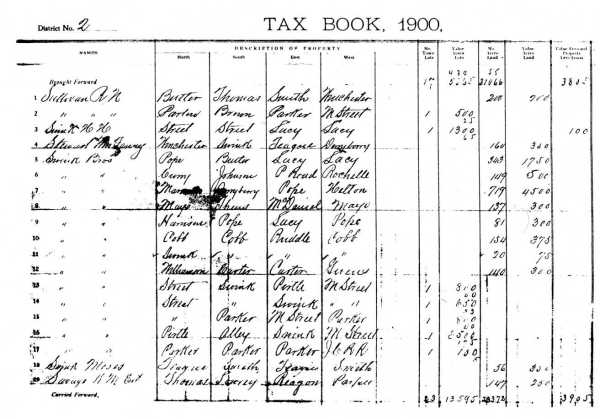
Larger image available
Return to Contents
